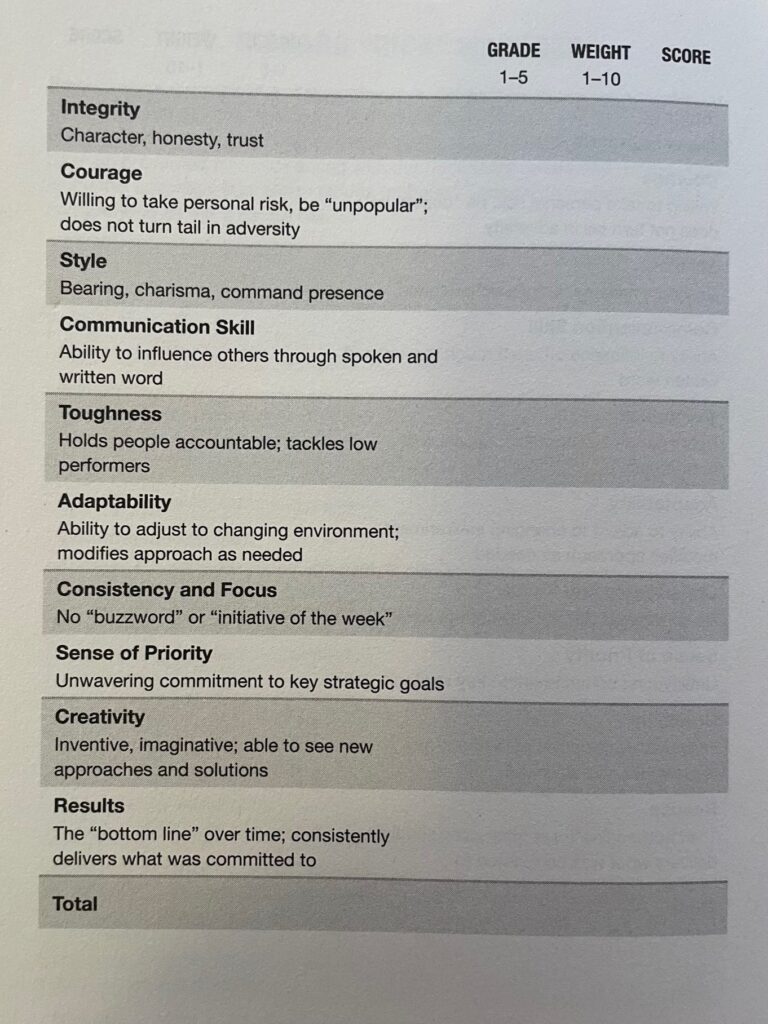Diehards to Blowhards; Tips for Evaluating Leaders
This is a no BS way to evaluate current, and past, leaders. It’s a simple format but requires some honesty where opinion will undoubtedly creep into the equation. Still, I think Mr. Bob Lutz, a former Marine pilot and noted auto industry leader, has hit on a formula that works. After seeing it in his book, Icons and Idiots, I like his method. In his rating system Bob has chosen ten traits and given a weighting to each. Each trait receives a score and is multiplied by the weighting, for a total score of each attribute. These are then totaled to reach a final overall leadership effectiveness score.
Naturally, these scores also reflect directly on the kind of person the leader in question is. We frequently, especially these days with a critical press and bandwagon politicians who love to capitalize on the average Joe’s sense of envy and jealously, like to think of company leaders as evil, insensitive, shallow people driven primarily by power and greed. I think if you did a survey, got to personally know most leaders, you would be surprised to find people driven by improving the human condition, helping others, concern for the welfare of their employees; individuals who are driven to succeed for the benefit of their company and the people who work there. They generally have a high level of integrity and purpose, are courageous and yes, have a certain charisma or carriage that makes them stand out in a crowd. They have much to contribute, a high work ethic, and the desire to act. They feel it would be immoral for them not to offer that service. I think the great ones also have a certain humility about them; they know it is a privilege, an honor to serve, and leadership is how they do that.
In Bob’s rating system, the person gets a rating in each category from 1 to 5, 5 being excellent. Then, he attaches an importance factor to each trait, rating them from 1 to 10, with 10 being the most important. The ten characteristics he rates as most important are: Integrity, Courage, Style, Communication Skill, Toughness, Adaptability, Consistency and Focus, Sense of Priority, Creativity, and last but not least, Results. Importantly, he leaves the weighting of each of these to the individual doing the rating, so this will always be a subjective accounting. I like the weighting he has provided – in my humble opinion I think he’s gotten it right.
Lutz starts with Integrity, which he distills as character, honesty, trust. I think the order he presents these is important, as it reflects what Lutz ultimately deems to be top of mind considerations when rating leaders, even if he does attach different weighting to these. The weighting goes like this: Integrity – 10, to my mind without this a leader has nothing; Courage – 7, described as willing to take personal risk, be ‘unpopular’, does not turn tail in adversity; Style – 5, bearing, charisma, command presence; Communication Skill – 5, ability to influence others through spoken and written word; Toughness – 6, holds people accountable, tackles low performers; Adaptability – 6, ability to adjust to changing environment, modifies approach as needed; Consistency and Focus – 5, no ‘buzzword’ or ‘initiative’ of the week; Sense of Priority – 8, Unwavering commitment to key strategic goals; Creativity – 7, inventive, imaginative, able to see new approaches and solutions; Results – 10, the bottom line over time, consistently delivers what was committed to. Notice he attaches at least average weight of importance to all of these, meaning a leader needs to be better at every trait than the average worker.

There is one thing for this list I harped about earlier, and that’s humility. It may be the toughest trait to maintain, but I think it’s important. Sure, you can put it under Integrity with character, but for me it’s important enough to mention on its own. In today’s world of endless self-promotion and social media, humility is a lost art. Somehow we think if we are humble, no one will notice us. That not only sells you short, it sells everyone around you short. It confirms you lack belief in the worth of the people around you, and people in general. I can’t think of anything more depressing.
I’m using this system to rate the capability and capacity of our management team. I want it to help me predict and mentor our next leaders.
Bob Lutz is a highly respected, retired auto industry executive known for his ability to innovate and reinvigorate product lines. Lutz headed global product development, or served as an executive vice president, vice chair or chair at companies like BMW, Chrysler, Ford and GM. Among the several books he has authored, Icons and Idiots, Straight Talk on Leadership is one of my favorites.




